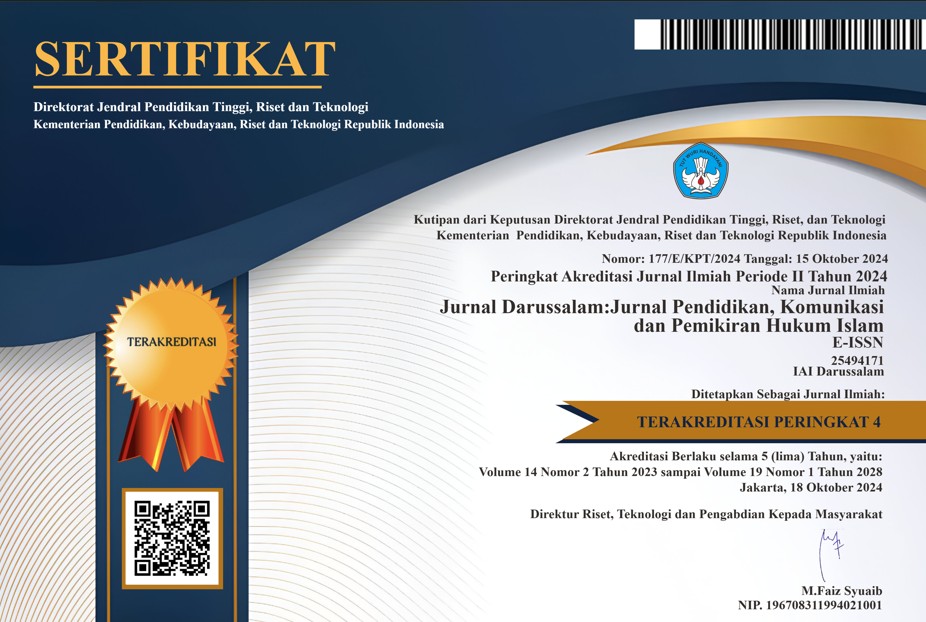PENGARUH METODE PROBLEM BASED LEARNING DAN PENGGUNAAN BUKU TEKS UNTUK PENINGKATAN KEMAMPUAN KOSA KATA BAHASA INGGRIS BAGI SISWA KELAS VIII DI SMPN 1 GENTENG
DOI:
https://doi.org/10.30739/darussalam.v15i1.2459Keywords:
Problem Based Learning, Textbook, Vocabulary AbilityAbstract
Mastery of English requires a lot of vocabulary and adequate grammatical forms. A large vocabulary without being based on strong grammar makes it impossible for us to properly understand a reading and vice versa, good grammar without having a vocabulary. To simplify and overcome this, it is necessary to use the Problem Based Learning (PBL) learning model and learning media, Problem In this study, the method used was the Pre-Experimental Design method with the One Group Pretest-Posttest Design research design, where in this design a causal relationship will be revealed by viewing one group of subjects. The data analysis used in this study used descriptive statistics. and inferential statistics. Analysis of data on test results for students' vocabulary comprehension abilities was carried out quantitatively. The statistical test used in this study is the inferential test of the independent t test. Daa analysis using SPSS version 24. The results showed that there was a positive and significant effect of the use of picture story books on the speaking ability and English vocabulary of junior high school students. These results indicate that junior high school students who are taught with picture story books as a medium have an increased speaking ability using English vocabulary compared to before learning.
Downloads
References
Andriyani, S. (2016). Linguistics and Applied Linguistics. In Jurnal Edulingua (Vol. 3, Issue 1, pp. 25–30).
Ariyana, Y., Bestary, R., & Mohandas, R. (2018). Buku pegangan pembelajaran berorientasi pada keterampilan berpikir tinggkat tinggi. Direktorat Jendral Guru dan tenga kependidikan kementrian pendidikan dan kebudayaan.
Arsyad, A. (2013). Media Pembelajaran (A. Rahman, Ed.). PT. Rajagrafindo Persada.
BNSP. (2006). Panduan Penyusun Kurikulum Tingkat Satuan Pendidikan.
Darma, S. D., SUWARNO, B., & Mulyadi, M. (2018). ENGLISH TEACHERS’ DIFFICULTIES IN DESIGNING A LESSON PLAN (RPP) BASED ON KTSP (A STUDY ON ENGLISH TEACHERS AT VOCATIONAL HIGH SCHOOLS IN BENGKULU CITY. JOALL (Journal of Applied Linguistics & Literature), 2(1), 72–82. https://doi.org/10.33369/joall.v2i1.5871
Dewi, R. S. (2022). THE INFLUENCE OF THE BLENDED LEARNING METHOD AND USAGE YOUTUBE VIDEO. Journal of Educational Technology and Innovation, 5(2), 1–11. https://doi.org/DOI: https://doi.org/10.31537/jeti.v5i2.966
Fitriah, R., Degeng, I. N., & Widiati, U. (2018). Efforts to Develop Children Fine Motor Skills Through Sticking Picture Properly by Using Combination of Explicit Instruction Model and Assignment Media Utilizing Natural Materials. Journal of K6, Education, and Management, 1(2), 25–30. https://doi.org/10.11594/jk6em.01.02.05
Insaniyah, A. L., & Nur Kumala, U. Y. (2022). Analisis Kesalahan Menulis Bahasa Arab Dalam Pembelajaran Imla`. TADRIS AL-ARABIYAT: Jurnal Kajian Ilmu Pendidikan Bahasa Arab, 2(1), 47–60. https://doi.org/10.30739/arabiyat.v2i1.1409
irfan fajrul falah, C. (2022). STUDENTS’ ATTITUDES TOWARD BLENDED LEARNING THROUGH GOOGLE CLASSROOM IN GENERAL ENGLISH COURSE. Journal of Educatiion Linguistis Litrature and Language Reaching, 1(5), 2723–165. https://doi.org/10.33059/ellite.v5i01.5249
Koten, A. N., Setyosari, P., Degeng, I. N. S., & Sihkabuden. (2016). The Effects on Problem Based Learning Strategy, Direct Learning and Learning Activeness towards Learning Academic Skills Five Grader Of SDK STA. Maria Assumpta Kupang. International Conference on Education, 90–99.
Kusumaningtias, A., Zubaidah, S., & Indriwati, S. E. (2013). Pengaruh Problem Based Learning Dipadu Strategi Numbered Heads Together Pengaruh Problem Based Learning Dipadu Strategi Numbered Heads Together. Jurnal Penelitian Kependidikan, 23(1), 33–47.
Lestari, S. L. (2014). Analisis Konsepsi dan Perubahan Konsep suhu dan Kalor pada Siswa SMA Kelas Unggulan. Unnes Physics Education Journal, 3(3), 77–83.
Mawaddah, N., Suyitno, H., & Kartono. (2015). Model Pembelajaran Discovery Learning dengan Pendekatan Metakognitif Untuk Meningkatkan Metakognisi. Unnes Journal of Mathematics Education Research, 4(1), 10–17.
Mulyani, T. (2019). Pendekatan Pembelajaran STEM untuk menghadapi Revolusi Industry 4.0. Prosiding Seminar Nasional Pascasarjana 2019, 453–460.
Oghyanous, P. A., & Khabiri, M. (2017). The Journal of English Language Pedagogy and Practice The Effect of Teaching Metacognitive Listening Strategy during Shadowing Activity on Field-Dependent and Field- Independent EFL Learners ’ Listening Comprehension. 10(21), 1–28.
Quigley, C. F., Herro, D., & Jamil, F. M. (2017). Developing a Conceptual Model of STEAM Teaching Practices. School Science and Mathematics, 117(1–2), 1–12. https://doi.org/10.1111/ssm.12201
Sormunen, K., Juuti, K., & Lavonen, J. (2020). Maker-Centered Project-Based Learning in Inclusive Classes: Supporting Students’ Active Participation with Teacher-Directed Reflective Discussions. International Journal of Science and Mathematics Education, 18(4), 691–712. https://doi.org/10.1007/s10763-019-09998-9
Ulfah, Y. (2023). Kesulitan Belajar Bahasa Arab Bagi Mahasiswa Program Studi Pendidikan Agama Islam Universitas Islam Zainul Hasan Genggong. TADRIS AL-ARABIYAT: Jurnal Kajian Ilmu Pendidikan Bahasa Arab, 3(1), 79–92. https://doi.org/10.30739/arabiyat.v3i1.1824
Van Blankenstein, F. M., Dolmans, D. H. J. M., van der Vleuten, C. P. M., & Schmidt, H. G. (2013). Relevant prior knowledge moderates the effect of elaboration during small group discussion on academic achievement. Instructional Science, 41(4), 729–744. https://doi.org/10.1007/s11251-012-9252-3
Downloads
Published
Issue
Section
Citation Check
License
Copyright (c) 2023 Jurnal Darussalam: Jurnal Pendidikan, Komunikasi dan Pemikiran Hukum Islam

This work is licensed under a Creative Commons Attribution-ShareAlike 4.0 International License.
Semua artikel yang dipublikasikan dapat diakses secara umum melalui online dan bersifat bebas download
http://creativecommons.org/licenses/by-sa/4.0/
















